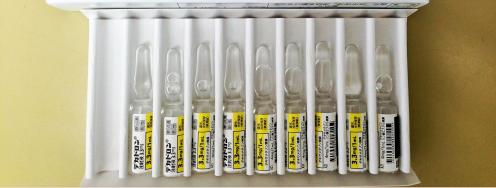Missileer Testing Scandal Worse than Reported
On the radar: Failing grades; the Disturbance in the force; Deterrence and Crimea; Russia starts Skynet; and Understanding Russia’s nuclear posture.
March 14, 2014 | Edited by Lauren Mladenka and Geoff Wilson
Low test scores worse than reported - “Failings exposed last spring at a U.S. nuclear missile base, reflecting what one officer called ‘rot’ in the ranks, were worse than originally reported, according to Air Force documents obtained by The Associated Press. Airmen responsible for missile operations at Minot Air Force Base, N.D., would have failed their portion of a major inspection in March 2013 but managed a ‘marginal’ rating because their poor marks were blended with the better performance of support staff — like cooks and facilities managers — and they got a boost from the base's highly rated training program. The ‘marginal’ rating, the equivalent of a ‘D’ in school, was reported previously. Now revealed are details of the low performance by the launch officers, or missileers, entrusted with the keys to missiles.”
--“The Air Force initially called the overall March inspection outcome at Minot a ‘success,’ reflecting the fact that the 91st Missile Wing as a whole was rated ‘satisfactory.’ But after The Associated Press learned in May about the ‘marginal’ performance in the missile operations sector of the inspection, the service disclosed that 19 officers had been forced to surrender their launch authority in April because of performance and attitude problems. That was an unprecedented mass sidelining of launch control officers, reflecting what the 91st's deputy operations commander at the time, Lt. Col. Jay Folds, called ‘rot’ in the force. Until now, however, it was not publicly known that of 11 crews tested on a launch simulator for the inspection, three were rated Q3, or ‘unqualified,’ which the Air Force defines as demonstrating ‘an unacceptable level of safety, performance or knowledge.’” Read the full report from Robert Burns of the AP here. http://bit.ly/1fAUm09
--“A Look at Nuclear Force Lapses Revealed So Far” by The Associated Press. http://abcn.ws/1iJBUBg
Nukes a poor option - “One of the most potentially disturbing effects of the situation in Ukraine is the possibility it may drive nuclear proliferation. The present crisis in that country could well have been a nuclear nightmare,” writes Andrew Gawthrope in The Diplomat. “Since Russia’s occupation of Crimea, a former Ukrainian foreign minister has called for his country to restock its nuclear arsenal and some Western analysts have questioned whether Putin would have acted so boldly if Ukraine still had its nuclear deterrent. The question can be expected to occur to leaders of other countries who are concerned about the territorial ambitions of their neighbors or the sincerity of Western security assurances.”
--“Any such moves towards proliferation would be unwise,” Gawthrope says. “Acquiring nuclear weapons may appear to provide an effective way for countries worried about their neighbors’ territorial ambitions to deter them, but the truth is not so simple. While nuclear weapons provide an effective deterrent against an all-out attack, they are not necessarily effective in deterring lower-level conflict.” Read the full article here. http://bit.ly/Oq1WjG
Tweet - @CNS_Updates: What's one way to prevent #terrorist theft of radiological materials? Substitute 'em, of course. http://bit.ly/1hiT6wH
Haven’t they seen Terminator? - “Russia on Wednesday announced the military would begin fielding robots this year to guard the country's strategic nuclear missile sites,” Global Security Newswire reports. According to Defense Ministry spokesman Maj. Dmitry Andreyev, “The robots can provide backup to security guards, discover intruders, ‘destroy’ moving targets and conduct surveillance missions.” Full report here. http://bit.ly/1i9l6EO
Re-emergence of de-escalation - “In 1999, at a time when renewed war in Chechnya seemed imminent, Moscow watched with great concern as NATO waged a high-precision military campaign in Yugoslavia,” writes Nikolai Sokov for the Bulletin of the Atomic Scientists. “The conventional capabilities that the United States and its allies demonstrated seemed far beyond Russia’s own capacities. And because the issues underlying the Kosovo conflict seemed almost identical to those underlying the Chechen conflict, Moscow became deeply worried that the United States would interfere within its borders.”
--“By the next year, Russia had issued a new military doctrine whose main innovation was the concept of ‘de-escalation’—the idea that, if Russia were faced with a large-scale conventional attack that exceeded its capacity for defense, it might respond with a limited nuclear strike. To date, Russia has never publicly invoked the possibility of de-escalation in relation to any specific conflict. But Russia’s policy probably limited the West’s options for responding to the 2008 war in Georgia. And it is probably in the back of Western leaders’ minds today, dictating restraint as they formulate their responses to events in Ukraine.”
--“To avoid a new arms race—one centered around conventional weapons, which are less terrifying but more usable than nuclear weapons—it makes sense to begin work now on arms control options that would cover modern conventional strike and defense assets. Unfortunately, the majority of the US Congress refuses to consider arms control arrangements for classes of weapons in which the United States currently enjoys an advantage. But as history has demonstrated, no technological advantage lasts forever. One hopes that those capable of averting a new arms race acknowledge history’s lessons before it’s too late.” Full piece here. http://bit.ly/1giAZ7I
Tweet - @globalzero: #Fact: A minor nuclear exchange could put one billion people at risk for famine. http://bit.ly/1fXy4qE
Quick-hits:
--“Quote of the Day: Sen. Sessions praises Obama’s nuke budget edition” by Kingston Reif for Nukes of Hazard. http://bit.ly/1dZsnq2
--“Iran Confers with Russia, China on Upcoming Atomic Talks” in Global Security Newswire. http://bit.ly/1o0uAo7
Event:
--“Nuclear Security and Japan’s Plutonium Path.” Discussion with Douglas Birch, Jeffrey Smith, Matthew Bunn, and Ambassador Nobuyasu Abe; moderated by Robert Einhorn. March 14 from 1:30-3:00 at Brookings, Falk Auditorium, 1775 Massachusetts Ave. NW. RSVP here. http://bit.ly/1jRpx7P



